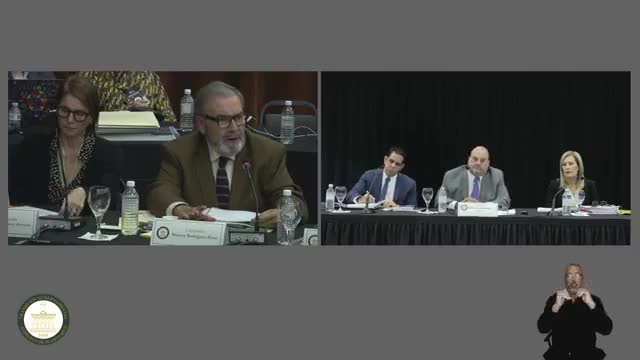Puerto Rico faces coffee supply challenges as production struggles to meet rising demand
December 05, 2024 | Transition 2024 - 2025, Puerto Rico
This article was created by AI summarizing key points discussed. AI makes mistakes, so for full details and context, please refer to the video of the full meeting. Please report any errors so we can fix them. Report an error »

Puerto Rico's coffee industry is facing significant challenges as local production struggles to meet the growing demand for high-quality coffee. During a recent government meeting, officials discussed the stark contrast between the island's coffee consumption and its production capabilities. Historically, Puerto Rico has consumed around 300,000 quintals of coffee annually, but local production has plummeted to an estimated 50,000 quintals this year, a sharp decline attributed to the devastation caused by hurricanes Maria and Fiona.
To combat this issue, the government has been actively incentivizing new coffee plantings, providing farmers with essential resources such as seedlings and fertilizers. However, the impact of these efforts remains to be seen as the industry grapples with the aftermath of natural disasters.
The meeting also highlighted the complexities of coffee importation. While anyone can bring coffee into Puerto Rico, it is subject to a tariff of approximately $2.50 per pound, established by U.S. Congress in 1931. The government, through the Agricultural Development and Export Agency (Adea), purchases coffee to ensure a stable supply for local roasters. This year, the agency has procured around 200,000 quintals of coffee, emphasizing the strict quality standards that have been implemented since 2021.
Despite these measures, officials acknowledged the financial strain on the government due to fluctuating coffee prices. The price at which coffee is sold to local roasters is regulated, but the cost of imported coffee has risen, complicating the market dynamics. The discussion underscored the delicate balance between protecting local farmers and ensuring affordable prices for consumers.
As the meeting concluded, officials recognized the need for a strategic approach to support the local coffee industry while navigating the challenges posed by both natural disasters and market fluctuations. The future of Puerto Rico's coffee production hinges on these efforts, as stakeholders aim to revitalize an industry that is not only a cultural staple but also a vital economic driver for the island.
To combat this issue, the government has been actively incentivizing new coffee plantings, providing farmers with essential resources such as seedlings and fertilizers. However, the impact of these efforts remains to be seen as the industry grapples with the aftermath of natural disasters.
The meeting also highlighted the complexities of coffee importation. While anyone can bring coffee into Puerto Rico, it is subject to a tariff of approximately $2.50 per pound, established by U.S. Congress in 1931. The government, through the Agricultural Development and Export Agency (Adea), purchases coffee to ensure a stable supply for local roasters. This year, the agency has procured around 200,000 quintals of coffee, emphasizing the strict quality standards that have been implemented since 2021.
Despite these measures, officials acknowledged the financial strain on the government due to fluctuating coffee prices. The price at which coffee is sold to local roasters is regulated, but the cost of imported coffee has risen, complicating the market dynamics. The discussion underscored the delicate balance between protecting local farmers and ensuring affordable prices for consumers.
As the meeting concluded, officials recognized the need for a strategic approach to support the local coffee industry while navigating the challenges posed by both natural disasters and market fluctuations. The future of Puerto Rico's coffee production hinges on these efforts, as stakeholders aim to revitalize an industry that is not only a cultural staple but also a vital economic driver for the island.
View the Full Meeting & All Its Details
This article offers just a summary. Unlock complete video, transcripts, and insights as a Founder Member.
✓
Watch full, unedited meeting videos
✓
Search every word spoken in unlimited transcripts
✓
AI summaries & real-time alerts (all government levels)
✓
Permanent access to expanding government content
30-day money-back guarantee
